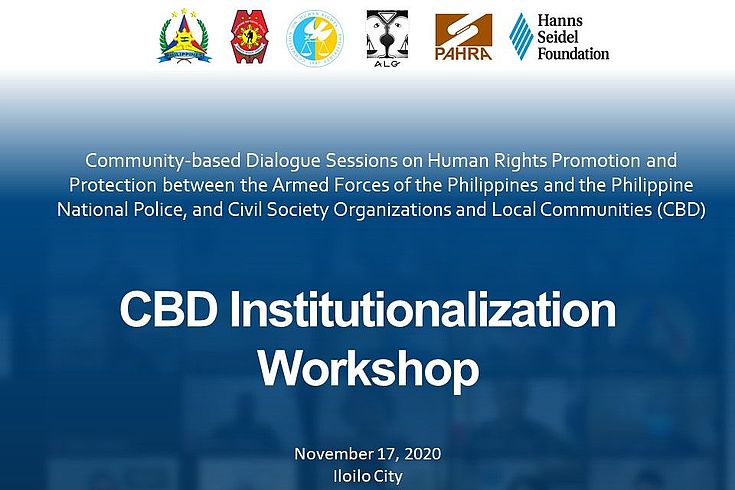On Community-based Dialogues Project
CBD Institutionalization Workshop held in Iloilo

HSF
The second leg of the institutionalization phase in the region was held in Iloilo province on 17 November 2020 organized by CHR-VI and PROCESS Foundation Panay, as co-convenor. The objectives were to: (i) broaden awareness and appreciation of the CBD as well as agencies involved and their policies on relevant human rights (HR) issues; (ii) agree on priority HR issues and action points on how to resolve identified issues; (iii) Identify HR promotion and protection mechanisms for resolution of HR Issues; and (iv) secure commitment from various stakeholders for the sustainability of the CBD.
Twenty-six (26) participants attended the one-day activity representing the CHR, Civil Society Organizations (CSOs), Armed Forces of the Philippines (AFP), Philippine National Police (PNP), Department of the Interior and Local Government (DILG), Department of Social Welfare and Development (DSWD), members of the provincial government and other LGUs, religious groups and workshop secretariat.
CHR-VI’s officer, Mr. Christopher Montano welcomed and thanked the partners and participants for attending the one-day activity. He shared a few information about the project as an introduction. Atty. Jonnie Dabuco, Regional Director of CHR-VI shared a message expressing thanks to the participants for their presence, and expectation that through this activity supported by Process Foundation and Hanns Seidel Foundation (HSF), the project will be sustained and attain its desired objectives, especially in providing a venue through dialogue to surface issues and find durable solutions. The provincial director of the interior and local government, Ms. Jody Sumagaysay, graced the activity with a message to fully support the passage of a Provincial Peace and Order Council (PPOC) resolution adopting the CBD mechanism to help mainstream the conduct of dialogues together with various sectors. CHR was pleased to hear DILG’s commitment and offered to serve as resource person during its deliberation in the council.
The AFP and PNP gave encouraging messages and brief presentations about their organization’s mandate, human rights situation in the region, programs/activities, accomplishments, as well as their commitment to protect/uphold/value the rights of every individual, adherence to the rule of law and genuine transformation especially in their area of responsibility. They also enjoined the participants to work together towards the institutionalization of the CBD to sustain the gains of the project through a principled dialogue anchored on trust and respect.
The project overview was presented by PROCESS Foundation Panay’s Manager, Mrs. Lorena Navallasca through a powerpoint provided by the Alternative Law Groups (ALG) including its rationale and background as well as status and accomplishments to date. It noted that for the current 5th phase of the project (2020-2022), the focus of the project is localizing the CBD to be able to sustain the gains achieved since 2008 by strengthening the capacities of the Core Groups in the focus areas to conduct a CBD.
A workshop/”buzz session” ensued thereafter to discuss the top 3 priority human rights issues in the province, identify/strengthen mechanisms to resolve these problems, and how the core group can work together to achieve the stated objectives. The participants grouped themselves according to sector, i.e., security sector, civil society organizations (CSOs)/religious groups, and government agencies. The workshop outputs were presented in plenary. The priority issues ranged from lack of delivery of basic services to far-flung barangays, land rights/land reform, violence against women and children, recruitment of child warriors by the NPA in Central Panay, using minors as drug couriers, children in conflict with the law, lack of commitment of LGUs (including monitoring of delivery of basic services), many local special bodies/committees are non-functional, and institutionalization of the CBD.
Among the agreements toward institutionalizing the CBD was to sign a memorandum of understanding/agreement among the core group members in Iloilo and serve as “warm bodies” in implementing the proposed PPOC resolution.
In closing, HSF’s project coordinator, Maria Adelia Co, thanked the organizers and participants led by CHR-VI and Process Foundation, and expressed appreciation on the results of the activity. She mentioned looking forward to the realization of the commitments made which would form part of the major accomplishments of the CBD project in Region-VI.
